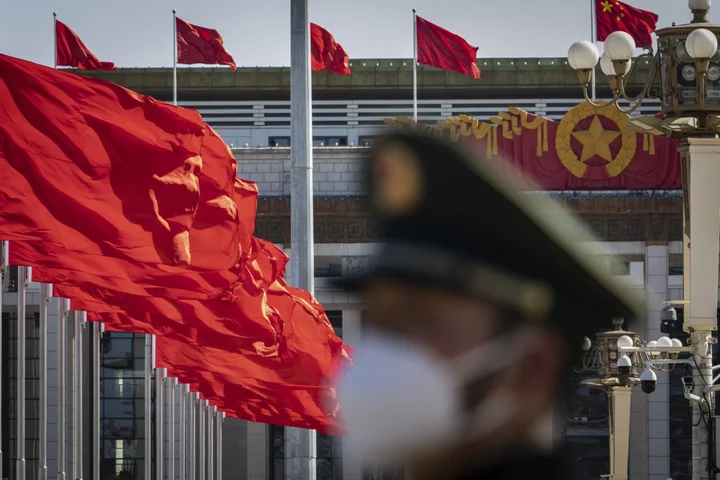The Group of Seven launched a new joint mechanism to counter economic coercion, a measure aimed largely at perceived hostile actions by China.
The leaders met on the issue on Saturday at their summit in Japan, Hiroshima. Their statement afterward did not mention China by name, but described a rise in incidents of economic coercion as “disturbing.”
The G-7 Coordination Platform on Economic Coercion would allow states to collaborate in areas including trade and investment restrictions, boycotts and threats such as cyber attacks, but it won’t mean an automatic response to instances of coercion.
The joint mechanism will “address the growing and pernicious use of coercive economic measures to interfere in the sovereign affairs of other states,” the UK government said in a statement. It added that China had used its economic power to “coerce countries including Australia and Lithuania over political disputes.”
China responded swiftly in a statement released Saturday on the official WeChat account of its embassy in the UK, accusing the G-7 of interference in its internal affairs, citing issues related to Hong Kong and Xinjiang. It called for the US to stop “bullying” allies to disrupt the stability of global supply chains, and urged the G-7 to abandon its “Cold War mentality.”
Bloomberg previously reported that G-7 nations aimed to send a signal to Beijing by announcing a joint effort against economic coercion, even as member states struggled to agree on more than a broad statement of intent.
“We should be clear-eyed about the growing challenge we face,” British Prime Minister Rishi Sunak said a statement. “China is engaged in a concerted and strategic economic contest.”
“And when Russia weaponized Europe’s energy supplies, it was a sign of what can happen when we rely too much on states who don’t share our values,” he added.
While member states wanted to better coordinate their responses to China’s economic practices, signing off on tangible measures proved more complicated, according to people familiar with the discussions. Officials wrangled over how tough to be in their messaging to China, particularly on specific tools that could be deployed against it.
Even as countries seek to diversify their supply chains, many of them, including G-7 states, remain economically intertwined with China.
Still, the US and Europe do show signs of moving closer to each other on their China policies.
The US language appears to be shifting, as officials start to adopt the phraseology of “de-risking” without “decoupling” that European officials now use.
US officials say the move has been a deliberate effort to show unity among the allies and a nod to Europe for coming around to facing the shared challenges Beijing poses. A European official said the region had become more assertive on China since the Covid pandemic with a greater focus on reducing economic reliance.
“We want a free and fair international order,” European Commission President Ursula von der Leyen said in her remarks to the session. “But we have to be aware of the risk of weaponization of interdependencies.”
“We should stay coordinated, as fragmentation is costly and we need predictability for our businesses,” she said. “That’s why our common response is de-risking not decoupling.”
--With assistance from Alberto Nardelli, Jenny Leonard, Isabel Reynolds and Dong Cao.
(Updates with details throughout on mechanism, G-7 statement)

